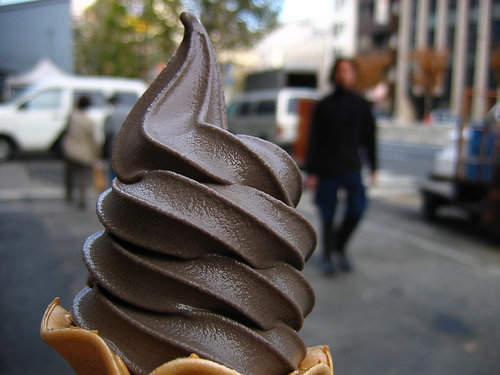The other day my wife asked me what a “window-breaker” was. I assumed she was asking about a type of jacket designed to protect you from the wind, but she just might have been talking about a person whose occupation it was to break windows. The problem is that Japanese is a syllable-based language, and generally not blessed in terms of the range of sounds you can produce with it. Foreign words like “wind” are written with the katakana writing system, but because you can only produce the sounds da, di, du, de or do but never “d” all by itself, the word “wind” always comes out a bit like “window,” something that takes getting used to. There are other phonetic rough spots built into the language, too. When Lord of the Rings (ロード・オブ・ザ・リング) was released here, a lot of fans thought it was Road of the Rings, due to the lack of differentiated L and R (ロード could also be “load”). Another problem area is that the sound “si” is pronounced as “shi” in Japanese, which means that a simple word like “sit” can be extremely embarrassing — and don’t even consider trying to use the English word “pushy” here, it will not mean what you think it will mean. Some other words that can’t be accurately rendered in Japanese are “love” and “rub,” which effectively become the same word; “curb” and “curve,” which also get reduced to a single concept; “cone” and “corn,” prompting millions to assume that the thing that ice cream sits on is made of corn; and the extremely hard-to-pronounce trio of “clash” “crash” and “crush.”
The Japanese are well known for using the grammatical rules of English to create new words, which are called wasei eigo or “Made in Japan English.” One of the most famous examples of these is “nighter,” which is what a night game of baseball is called here. Adding this “-er” suffix to words is a popular way to create new words, and there’s an extensive body of slang that makes use of this mechanism. For example, the word for “part time job” in Japanese is arubaito, borrowed from the German word arbeit, so naturally a person working such a job is an arubaitaa (arubeiter), also known as a freeter (for “free-lance albeiter”). Often these new words are invented to define a sub-group of society, for example people who love mayonnaise are widely referred to as mayoraa (mayo-ers), while people who love to collect Hello Kitty products are defined as Kitty-raa (Kittylers). There seems to be a connection to general otaku culture, too. It’s possible to extend the ending vowel of the word Akihabara to produce something like Akihaballer (egads, that’s hard to transliterate), which means otaku who spend lots of time in Tokyo’s electronics and anime hub. Of course, these silly words come and go all the time, so don’t expect to find them in a dictionary.
I saw a news report the other day that a major producer of instant noodles in Japan will be raising prices by 10-20 yen soon in response to the rising costs of raw materials to make their products. It seemed interesting to me that this was even news, since in the U.S. at least, most people take the slow creeping of inflation for granted, assuming that most things will be more expensive next year than they were a year ago. But for some odd reason, this rule doesn’t generally apply to Japan, where the inflation rate always seems to be low. Except for one hike in train fares a few years ago, I’d be hard pressed to name many prices that have gone up appreciably over the past decade — and in fact, some of prices have fallen, like when Yoshinoya lowered the price of their trademark Beef Bowl. Recently, however, the rising cost of oil has started to put real inflationary pressure on the country, with a liter of gasoline going for around $1.25, which works out to $4.50 a gallon. My wife is also mad because these useful plastic drawers we use to organize our house have shot way up in price.















